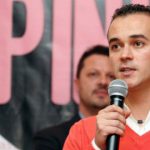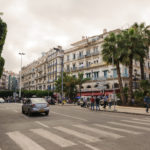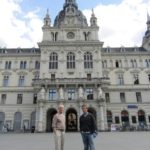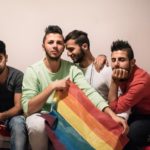(Updated May 2017)
Not So Gay Albania
Albania is a small eastern Adriatic country with a population of only 2.8 million people. The capital city is Tirana with a modest population of just over 400,000 citizens and is essentially the geographic extent of gay efforts at the present time. There are other smaller cities but with no organized LGBT activity.
Needless to say there is a fair amount of cov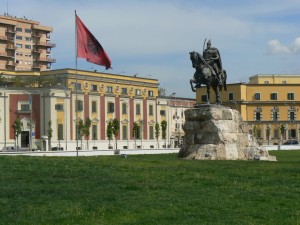 ert consensual activity such as in the southern resort city of Saranda on the coast with its gentle ambiance and beautiful sea views. I visited there on my first trip to Albania. Its convenient and lengthy waterfront promenade is served by numerous cafes, restaurants, kiosks but no LGBT venues. Yet it serves as a pleasant see-and-be-seen cruising ground, not that I saw any of this (in mid-May before the thousands of holiday-makers arrive) but it is an appealing setting for a quiet evening of walking and watching.
ert consensual activity such as in the southern resort city of Saranda on the coast with its gentle ambiance and beautiful sea views. I visited there on my first trip to Albania. Its convenient and lengthy waterfront promenade is served by numerous cafes, restaurants, kiosks but no LGBT venues. Yet it serves as a pleasant see-and-be-seen cruising ground, not that I saw any of this (in mid-May before the thousands of holiday-makers arrive) but it is an appealing setting for a quiet evening of walking and watching.
It should be noted that gaydar gets ‘jammed’ in this culture as men are not afraid to look at each other and touch and hold one another as friends; many do not shy away from eye contact. A naive visitor or just-coming out native can easily imagine more than meets the eye. Caution is always the watchword.
The country in general is not aggressively homophobic like Serbia yet neither is it very tolerant. LGBT people keep their secrets. There is only slight information and awareness about homosexuality in the country, especially for middle-age and older people who grew up under the repressive regime of Enver Hoxha (1908-1985; in power 1944-85) who clamped a repressive communist hold on every aspect of life here for more than 40 years. There was no personal expression of social issues outside party lines especially in politics and sexuality. Finally the dictator died in 1985 followed by the 5-year collapse of communism from 1996-1991 when Albania awoke from a half century of darkness into the 21st century.
One man I spoke with reflected that Albania in 2012 was “50-50” for and against homosexuality. His take on the high percent of tolerance was that repressive communism taught people to mind their own business and also that everyone was equal (even as the bureaucrats lived privileged and corrupt lives.)
Fifty-fifty leaves half the population who do not understand or accept same-sex attraction as valid. So there is work to be done starting in Tirana.
LGBT Activism
That’s where the two LGBT activist organizations Pink Embassy/ProLGBT (PE) and the Alliance Against Discrimination (AAD) come in.
I met with Enida Bogdani one morning at the 5-star International Hotel that overlooks the central square in Tirana. She is on the staff of Pink Embassy as the communications director who cheerfully offered information about PE and about Albanian attitudes toward LGBT citizens.
Speaking excellent English, Enida said Gay Pride in Albania is small but on the move with Alliance Against Discrimination and Pink Embassy (PE) both formed in 2009 when the first events for IDAHO (International Day Against Homophobia) took place in Albania. In November 2011 PINK Embassy/LGBT PRO Albania was officially registered with the local authorities as an NGO, which allowed them to open an office where they now offer a small variety of services including a safe space where people, especially youth, can bring their questions as well as their need for companionship.
PE is a modest effort that’s being funded by the Netherlands government and the local Children’s Rights Center of Albania (CRCAL). PE cautiously grew out of CRCAL as a quiet offshoot of their human rights work in the country.
Cautious because when the first public announcement was made about PE being supported by CRCAL the local press, with little or no experience of reporting on LGBT issues, sensationalized and exaggerated it as a Gay Pride Festival happening. Reactions were as expected, vocal and negative, but in a land that has seen no public presence of LGBT citizens, it was not surprising. The director of CRCAL, Altin Hazizay, spent some time damping down the noise and correcting shallow press coverage, which soon subsid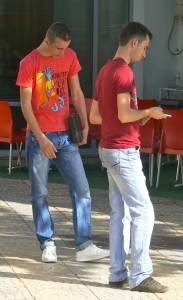 ed.
ed.
Agents of change
1 Time
One of the strongest agents of change, Enida observed, is time. The older generation has little familiarity with homosexuality. Most know what it is but respond with a knee-jerk rejection toward it, thinking it’s a mental disorder. Today there is an ‘age divide’ between young people born after 1985 and those who survived the Hoxha years. Looking around downtown Tirana today there are numerous trendy cafes where young people hangout by the thousands, men dressed in the ubiquitous jeans and T-shirts and black jackets. After the age of 35 or so clothing changes to baggy jeans and button shirts. The old ones are often noticeable by their dowdy coat-and-tie outfits or suit jackets and baggy trousers.
The source of negative reactions to homosexuality might be attributed to the usual villains, religion and politics. But the recent history of Albania has been as an officially ‘atheist country’. About half the population identify as non-religious Muslims as advocated by dictator Hoxha who, during his forty socialist years in power, focused more on social and economic matters to move the country somewhat forward. Statistically he did, increasing medical care and supporting manufacturing without much international investment. As a communist, Hoxha had little use for religion as a practical institution seeing it a parasite rather than a benefit to people.
Today churches are returning as a force but in general the Orthodox and Catholic systems do not (yet) play a strong role in everyday life. But homophobic attitudes from the pulpit are well known in present day Albanian culture. Even atheists can still be homophobic but time and minds and youth are changing, slowly.
2 Changes in the Law
Another other force for change has been the government’s laws and attitudes. Homosexuality was an illegal act during the Hoxha years but was decriminalized in 1995. Obviously this influenced negative attitudes in a general way for the better but still comes up against the online world of homophobia spread by numerous live anti-gay groups and other homophobic eastern Europe countries online (a legacy of the Soviet years that still today clings to strong anti-gay attitudes in persecuting and harassing LGBT activists who try to bring human and gay rights forward).
In the background of these changes in the legal status of homosexuality is Albania’s desire to eventually join the European Union. The Union’s legal statutes and ethical standards clearly forbid discrimination against any minorities, including gays, which rankles resistant hardcore traditionalists who can only think of same-sex attraction through age-old scriptural prohibitions.
3 LGBT Activists
The third force for change in modern LGBT Albania is the presence of two bold and active LGBT organizations: Pink Embassy/ProLGBT and the Alliance Against Discrimination
Pink Embassy
Since Pink Embassy went public both actually and virtually, they have received positive and practical support from a few Albanian and foreign sources. In return they offer services, especially to young LGBT people who usually feel isolated and need contact and support. PE has an office where people can drop in and talk with volunteer staff. Enida said they will offer counseling to troubled youth. However, the manager of children’s charity CHHRC, Belioza Soku is a psychologist and plans are in effect to train more volunteer staff to do counseling to needy inquirers. At Pink Embassy there are activities for young LGBTs 14 to young 20s who do not want to isolate and do want to talk and be out and connected. Enida observed the over 25s tend to be less daring; most are protective and cover themselves with heterosexual marriages with offspring to keep their secrets out of sight.
Enida went on to say that because of the immaturity of both PE online and lack of healthy LGBT role models, many youth think begin gay means looking for sex including looking for foreign ‘sugar daddies’ to support them. “There is not yet a mature community with observable models for stable and sincere relationships; long-term couples are a rarity, at least in public.” Gay youth know little about the durability and validity of gay relationships so naturally they are inclined to search only for sex. PE sees this as a significant health challenge as well as a psychological deficit. Changing mindsets, especially negative ideas held by young gay people, takes time. “We are here in the same place America was in 1955,” she said.
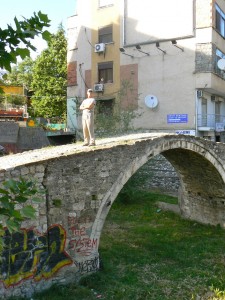 The first gay ‘festival’ for 2012 was actually a formal walk to the state ombudsman’s office for human rights to officially request bringing a Rainbow Flag to the Prime Minister’s office–a ‘flag parade’, if you will. This small symbolic act was blown out of proportion by the media to increase sales with sensational reporting, explained Enida. Subsequent to the publishing of inaccurate and biased reportage the US embassy sponsored a sensitivity training for the media to teach them about homosexuality and responsible unbiased reporting.
The first gay ‘festival’ for 2012 was actually a formal walk to the state ombudsman’s office for human rights to officially request bringing a Rainbow Flag to the Prime Minister’s office–a ‘flag parade’, if you will. This small symbolic act was blown out of proportion by the media to increase sales with sensational reporting, explained Enida. Subsequent to the publishing of inaccurate and biased reportage the US embassy sponsored a sensitivity training for the media to teach them about homosexuality and responsible unbiased reporting.
Nevertheless, in addition to the symbolic walk between government offices there was a sort of subdued show of diversity, in 2011 and 2012, as part of IDAHO Day, held outdoors near the huge communist-era and graffiti-covered pyramid in central Tirana. Tented stalls were set up for various human rights and health organizations to present their work and hand out information, including Pink Embassy who decorated their stall with photographs and a sprinkling of rainbow colors. There was no parade and no gyrating dancers in Speedos with pink boas, rather a colorful bicycle ride though the capital, which as attacked by nationalist skinheads and intolerant gangs. A modest human rights conference was also held later in the day. In 2017 the tradition continued with the usual bicycle Pride ride through central Tirana with government and police support and protection. A huge Rainbow Flag was unfurled, as usual. Kiosk tents were set up to offer information on homosexuality, human rights and social services.
Enida said the leaders of PE and CRCAL work an uphill effort to educate parliament members and law enforcement personnel, virtually all heterosexuals with little experience of sexual minorities.
Prior to this, in 2010 PE filed an official complaint with the anti-discrimination commission against a homophobic parliament member who declared publicly that homosexuality was a disease that should be treated with hormones. The commission redressed the member for his discriminatory and inaccurate remarks.
In 2012 PE filed another complaint— a criminal complaint–against the Albanian vice-minister of defense for attempting to incriminate LGBT people in crimes against children.
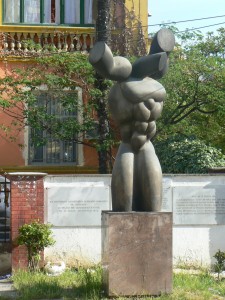 The USA embassy training was part of its (and UK’s) effort to include equal human rights as part of the embassy’s mission in countries around the world. In response, many third world countries have presented a mask of humanitarian changes in a gesture to collect western money. Albania is no exception as many citizens are aware of much government corruption. It is difficult to get accurate information about bureaucratic workings as the ‘system’ fabricates facts to suit wealthy foreign donors. “The government is corrupt from the PM on down to his cabinet who manipulate public and foreign opinion to get money which they then steal for themselves then skimp on poor quality computers, poorly paid teachers and leave our roads in terrible condition. The government takes 10% of our money and give us bad roads,” said Enida in an exasperated tone of voice.
The USA embassy training was part of its (and UK’s) effort to include equal human rights as part of the embassy’s mission in countries around the world. In response, many third world countries have presented a mask of humanitarian changes in a gesture to collect western money. Albania is no exception as many citizens are aware of much government corruption. It is difficult to get accurate information about bureaucratic workings as the ‘system’ fabricates facts to suit wealthy foreign donors. “The government is corrupt from the PM on down to his cabinet who manipulate public and foreign opinion to get money which they then steal for themselves then skimp on poor quality computers, poorly paid teachers and leave our roads in terrible condition. The government takes 10% of our money and give us bad roads,” said Enida in an exasperated tone of voice.
Alliance Against Discrimination
The other LGBT-Human Rights organization in Tirana is the Alliance Against Discrimination which is sponsored by the USA embassy. (e-mail: info@aleancalgbt.org) Aleanca Kunder Diskriminimit te LGBT, since may 2009, has been an organization of straight, gay, lesbian, bisexual, and transgender people, more broadly based than PE, who stand against discrimination on the basis of sexual orientation and gender identity. The Alliance maintains a website that connects people and helps arrange events and parties. Although the two LGBT organizations are not closely coordinated with one another they came together for the celebrations and activities of IDAHO day. It’s director is Xheni Karaj.
Events for the annual IDAHO day include: a photo exhibit of gay life; a rock concert; a documentary film showing; educational seminars; public leaflets and posters offered in public places; and a A 30-second TV spot broadcast in support of LGBT rights featuring Albanian activists, artists, journalists and public officials. For a closeted country this is a bright and bold step forward into the future. See this report about the Alliance Against Discriminaion
On To the Future
Enida,, like other LGBT activists is well educated having been schooled abroad in Australia in Geelong Town and in the Netherlands for college, studying law, psychology and liberal arts. Such a broad background provides her with a wider perspective for her work both as a national leader as well as a networked member o worldwide LGBT organizations abroad. Her spoken English was excellent as she described Albania as generally not tolerant of homosexuality yet without the malice and violence seen elsewhere in the Balkans. “The macho guys like to target other guys who seem too well dressed, too fashionable or colorful. As you can see around here most young men wear jeans and black jackets; it almost a badge or a code of inclusion and if you are different they may tease or ridicule but rarely attack.”
Times are chang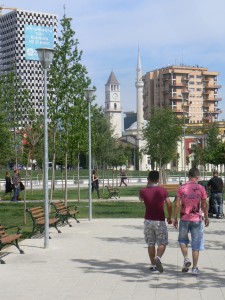 ing as the younger generation born after the collapse of communist rule, late 1980s and early 1990s, are more western, aware, prosperous, internet savvy and more expressive. Homosexuality is not unknown thanks to TV, international shows, films, Facebook, gayRomeo.com. It is not the big forbidden topic of communist years. “Awareness precedes tolerance so that is working in our favor,” explained Enida. Homosexuality was decriminalized in 1995 and the Since 2001, the age of consent was made equal for everyone, at 14. In February 2010, the Parliament of Albania unanimously approved an all inclusive anti-discrimination law which bans discrimination in on the grounds of various characteristics, including sexual orientation and gender identity.
ing as the younger generation born after the collapse of communist rule, late 1980s and early 1990s, are more western, aware, prosperous, internet savvy and more expressive. Homosexuality is not unknown thanks to TV, international shows, films, Facebook, gayRomeo.com. It is not the big forbidden topic of communist years. “Awareness precedes tolerance so that is working in our favor,” explained Enida. Homosexuality was decriminalized in 1995 and the Since 2001, the age of consent was made equal for everyone, at 14. In February 2010, the Parliament of Albania unanimously approved an all inclusive anti-discrimination law which bans discrimination in on the grounds of various characteristics, including sexual orientation and gender identity.
Prior to this passage, Prime Minister Sali Berisha (in office from 2005-2013) unexpectedly declared his support for same-sex marriage at a televised meeting of his ministers. The surprising July 2009 comment came amidst his expected support for the comprehensive national anti-discrimination law. (Edi Rama is the current prime minister, a politician, artist, writer.) Since then, however, little has been said officially about gay marriage but for LGBT citizens the push continues: in 2017 the PRO-LGBT leader Kristi Pinderi (photo right) announced they would file a lawsuit requesting equal recognition of gay relationships. 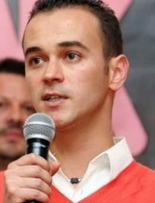
In May 2012, cheerful activists in Albania rode in rain and dodged a smoke device thrown at them by a young man (who was taken away by police) on their “Ride against Homophobia” along the main avenue of the capital Tirana as part of the country’s IDAHO 2015 celebrations. It was the first such event of its kind to be held in Albania. They wore IDAHO t-shirts and balanced umbrellas. Despite the one minor incident the ride went happily to its conclusion with a media interview and a sponsored (by Italy) conference and press conference afterwards.
And what’s also slowly happening across the land, in private, is that more families are gradually accepting their LGBT adult children each year.
Such push-and-pull social shifting is not unusual as a society goes through cultural shifts. the old resists change and the new pushes forward, both clashing as a new paradigm slowly emerges. Albania today is not the Albania of 1970 or 1995. Change and renewal are always in motion. It can be expected within the next twenty years that homosexuality will be reacted to with a shrug and much more tolerance. It’s a new world in a new century.

